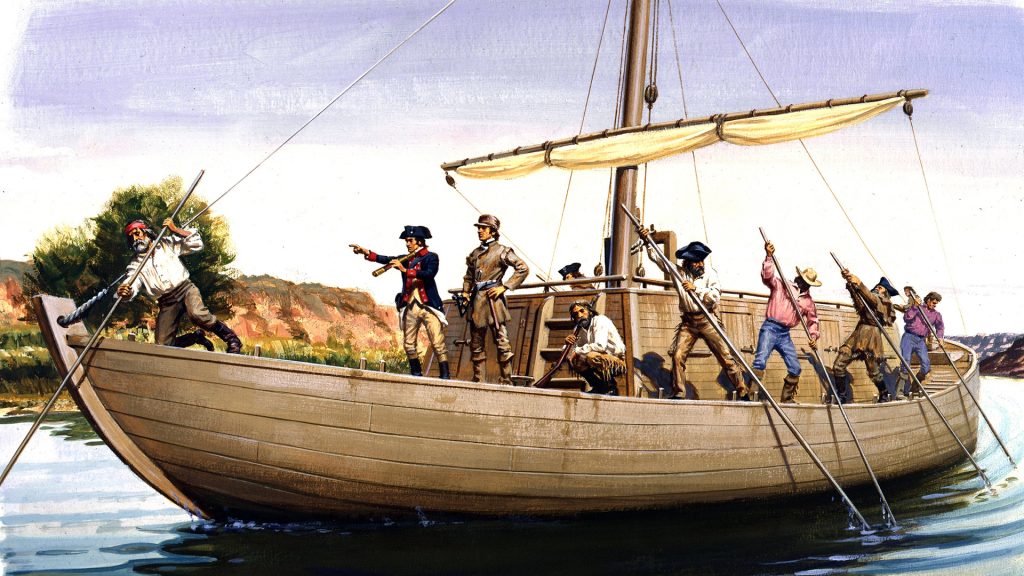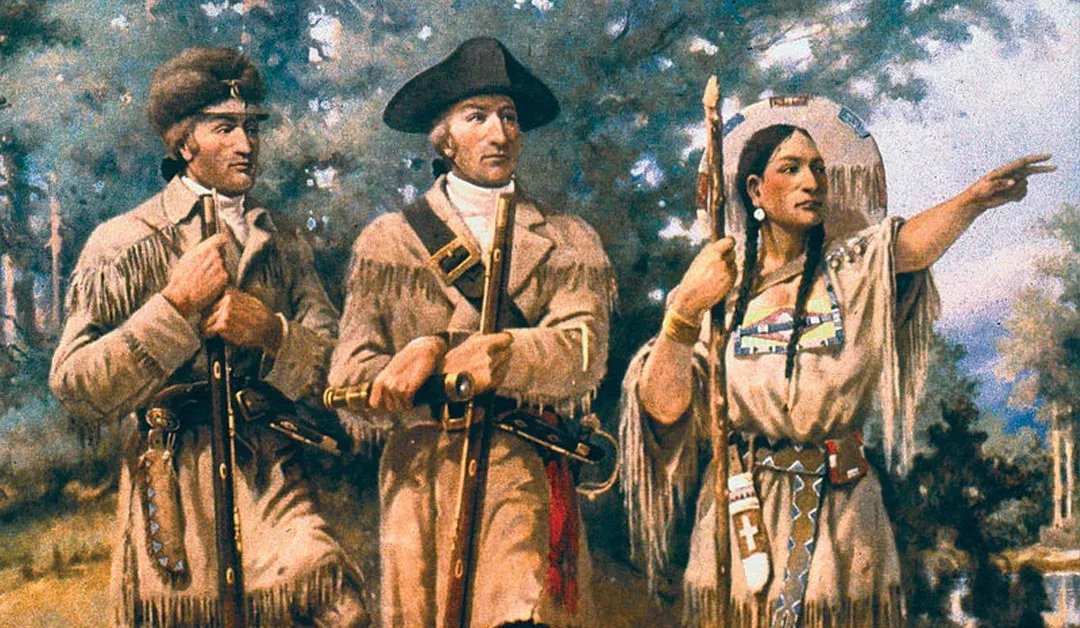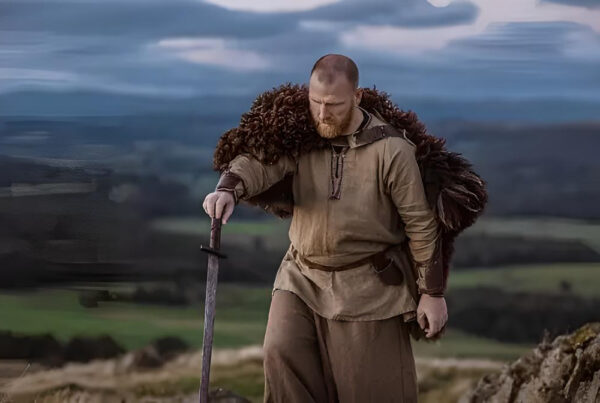Meriwether Lewis and Captain William Clark are two of the most well-known frontiersmen of the West. They embarked on a two-year adventure from Missouri up through the plains and northwest — the first of its kind. During this time, the land was seen as almost mythical, with Thomas Jefferson even believing there could be wooly mammoths and Welsh-speaking Indians in the uncharted lands beyond the Rocky Mountains. Lewis and Clark were imperfect but heroic men with vastly differing personalities — they personified the complexity and depth of the Western explorer.
Lewis grew up quite wildly without formal education until his teens. He was a daring hunter with a dog always at his side and learned much about plants from his mother, Lucy. She was an esteemed herbalist and imparted to him a rich understanding of their healing properties — on his expedition, he healed himself using intuition to filter his general knowledge. After leaving the main party with a few men, Lewis developed a high fever with debilitating intestinal pain and decided to experiment with a plant unknown to him, now called chokecherry. He had his company boil its stems into an astringent tonic, drank it, and continued for 27 miles the next day.
Lewis was a headstrong man with a brilliant imagination and a love for the natural world. His curiosity was not about trying to control nature but understanding to live in symbiosis with it — the epitome of an apex predator as keystone species. Many believe that man is a suffering animal because of his mind. Still, he and Clark epitomize a higher-order fusion of primal nature and the full range of consciousness emanating from divine essence — not a reduced state of a simulation of the logical mind. Lewis seemed more eccentric in his interaction with people, being fiery and idealistic. He met his commanding officer, Clark, after being transferred for dueling.
Clark was a down-to-earth family man with many children, unlike Lewis, whose eccentricities spilled over into his seeking a soulmate in a woman. Clark also came from a line of warriors and hunters who loved the arts and the natural world. Clark is criticized by the current paradigm of morally perfect nitpickers for having a slave he was not endeared towards even though that slave had a higher quality of life than slaves on the African continent they were initially sold by. Sacagawea, a young woman belonging to the Lemhi Shoshone tribe, played an instrumental role in aiding the Lewis and Clark Expedition to accomplish its officially commissioned objective. The fact that Clark adopted Sacagawea’s son is of no consequence or is hyper-focused on in a manner of seeing all people as interchangeable detached parts from their entire living chain of origin and deeds — an all or nothing of him being entirely racist or an example of everyone mixing into a meaningless amalgamation. Clark personified the orderly masculine northwestern European with nuance in understanding race relations — seeing some similarities with natives and far less with blacks.
Both men showed the European spirit of understanding towards the Indians, even if at times fighting with them, yet only showed interest in White women — a direct contrast to Thomas Jefferson, who sent them on the expedition. Not only did Jefferson copulate with his black slaves and saw the natives as the same as White settlers instead of the similarities and differences. His idealism was driven by impulse, while Lewis’s was driven by wonder with a higher ordering of complexity. Jefferson’s type of humanist idealism caused reactions like all multicultural random mixing of people together does — it is an assault on people’s sense of self and an imbalance into Becoming without respect to Being in the formative processes of organic ethnogenesis. His emphasis on trade was bound to cause both sides’ rapid expansion and hostile reactions. Lewis and Clark’s interactions with Indians maintained separate identities while learning about and from them and were far more reasonable. Lewis was a bit more on the over-empathizing and idealizing end, which gives insight into the range of Europid altruism to learn from. Clark was diplomatic and fair — making them a very balanced team.
It is entirely overlooked that Sacagawea was kidnapped in her early teens by another native group and then sold to a part French and indigenous trapper with already a few brides because Whites are held to a higher moral standard in judgment but not given credit where it is due. The natives had a wide range of tribes that warred or worked together at times with an even more comprehensive range of past ancient layering and recombinations that were either congruent with frontiersmen or in opposition to them. These are very natural processes seen among all tribal people. Still, Whites are blamed instead of understanding the long chain of mechanizing processes that distorted historical understandings of this natural occurrence of differences between groups. Colonization is a far over-blanketed concept that dehumanizes the Western man and gives every concession to all other races.
Spiritual Congruence in Ethnogenesis Creating a Trickle of Divergence
The adoption of her son by Clark was a cultural tradition of northern Europeans that shows organic forms of ethnogenesis. The person is considered for their congruency both by deed and chance of the ever-changing web of will and potential destiny — which some call the transmundane or others a living origin myth. This has an interplay between the spiritual and physical worlds in creating meaning. Ethnogenesis between similar people happens always on the periphery with respect to the foundation. Even within a people, there will be divergent recombinations and ranges from past layering that does not represent the whole of their group. Thus, circumstances of their inner essence and the ever-changing web of potential fate lead them to another path because innate in them, both essence and form, is something congruent with another ethnos or a new ethnos offshoot. Their journey together was spiritually bonding and part of real ethnogenesis that is more rapidly shifted in times of war, external pressure, or exploration. Notice that it was her son Clark adopted but not any of the other children of the father’s, even if he was the one with White parentage.
This small percent of native inclusion could even parallel past waves of migration, allowing some to have more spiritual congruence far before scientific proof was even possible. We now know that there were many ancient waves of migration across the global north of Europid ancestry, found in skeletal remains and haplotype tracing. Few western Whites having a far back small percentage of native from this formative process of selection is not a carte blanche to say multiculturalism is healthy, that current-day Indians and Whites should mix at random instead of preserving their genetic and cultural diversity, nor does it say anything negative about that admixture because it was done in an organic manner respective to the cultures’ traditions which encompass the wisdom of its spiritual selective formative processes. The few natives with the most significant genetic congruency were already assimilated in a small trickle of ethnogenesis.
The natives, like the Westerners, maintained their own cultures, and the ethnogenesis was a small trickle between competing groups and an example of how past layering of ancient people might ripple into future recombinations of congruence in essence and then form. Seeing race or ethnos as spiritual or material only is a false dichotomy because these matters are not separate but ripple into each other over time — blood and spirit are both more complex than the statistical averages they represent, and neither is detached from the other like all essence from form.
We see similar processes in other cultures, even with different strategies. In Russia, there is an inverse tradition from exploration since they have low population density and vast natural resources by comparison. Historically, they allowed other groups to create settlements similar to how Lewis and Clark wanted to live in regards to the natives — allowing settlements with autonomy had a symbiotic value with some trickle of peripheral ethnogenesis into the foundation of ethnic Rus. The Rus were the dominant culture and expected to be respected by the rest.
In an interesting conversation, a Russian and a European argued over gypsies. They had opposing views over the same all-or-nothing vantage of people as interchangeable in their understanding of ethnogenesis and human bonds. Their experiences gave opposing perceptions — in Russia, there had been gypsy settlements, with some even achieving nobility status. In other parts of Europe with greater population density, they behave in a very low-functioning, predatory manner. The Russian traditionalist argued that it is how they are treated, so an entirely Nurture perspective that culture is simply transmissible to all people as interchangeable parts. The European nationalist asserted that it is altogether Nature — that they are simply not compatible with Europeans. Their two perceptions were both valid, but a deeper integration points to how true formative processes occur.
Every supposed homogenous group has a range of traits and past layering of ancient peoples, with those ranges representing differing spiritual complexity and potential congruences. Why is it that some gypsies chose to lead a different life in Russia, and some were drawn to predatory behavior? Gypsies must have had a wide range of genetic and spiritual diversity in past layerings. This is what living chains do when they are divergent, and it is representative of the range of their nature’s diverging to new cultural selective pressures they are congruent for. That some of those gypsies trickled into the Russian population or established their own settlements says nothing about the gypsies across Europe being compatible. Their living origin myth diverged based on their essence and the forms possible from it. Their differing paths are genetically and spiritually significant, and the distinctions are important. This also shows that when earned or congruent, the Northern European spirit of peripheral ethnogenesis is found in the Eastern global north in a different form but should not be reduced to a humanistic vantage of all people as interchangeable in migration.
Misinterpretations of Past Legends and the Dehumanization of Whites
What is even more telling in hindsight’s interpretation of more contextualized times is the speculation that Lewis and Clark were homosexual. Those lost to the material void cannot understand the connection of the same sex in Platonic bonds or the importance of other forms of fulfillment than just base sexuality, like a mythical exploration into the unknown. Virility is a healthy trait that should not be demonized but encouraged into marriage and children — however, in rare cases of greatness, this energy can be transmuted into such endeavors.
Their turning down native women presented to them like cattle for sexual pleasure is used to distort the beauty of their unique masculine forms, which higher ordering apexes will exhibit the greatest range of. Their ability to refrain for a greater goal is not understood by these simplistic, reduced times — and had they not, they would be vilified and used in another way to demonize virile masculinity as sexually predatory. These men are now used in every way for politicization in a manner that harms authentic understandings of European living culture and dehumanizes our legends.
Another meaningful aspect of their exploration was naming the plants and animals they discovered in a personal manner, another deep Northern cultural tradition that stems from a connectedness of understanding the layering of all things in a living system that we stand upon. Items, animals, plants, and ecosystems were not separate but respected for being the foundations of the life and death cycle — not lifeless matter. There is a form of respect for all aspects of life when everything is personalized instead of seen as a commodity, which is why the material void creates so much refuse along with the destruction of so many species in a short time. It is even more significant that they gave their own and others’ names to these plants, not just some abstract terminology.
Interestingly, many of the plants they named on the trip were from the rosacea family. New forms of the same essence of the European family grew into their own ecosystems. This also points to a past connection to the European continent since the same family of plants is native to the entire global north. This parallels past waves of exploration of Europid ancestors that some natives had genetic and spiritual remnants of because the entire global north is essentially European, just like the rosacea family of plants. Lewis and Clark exemplified the explorer archetype and were another layer to past waves of European exploration.
These beautiful but imperfect souls were not individualistic on some false axis of materialism in seclusion or being easily coerced into collective mechanization. They were simply the barbarians or heroes — the individuated parts of a living culture. The way they even worked together shows this. Clark was the superior at one point and must have been an impressive leader. When Lewis rose by his eccentric and brilliant capabilities, he did not egotistically use his new position but shared command with his previous commander. In this manner, they both exemplified first among equals in leadership capability. It is a testament to this high-trust ability to work together that they accomplished such a feat. They defended themselves against grizzlies, rattlesnakes, and bison with rudimentary weapons, and over two years of dangerous and rough living, only lost one man.
The current globalist zeitgeist follows along these lines of seeing complex beings as antithetical to the rest of the world as a way to destroy White males and the wide range of complex masculine forms to aspire to and learn from. Colonialism is oversimplified from all angles and used to make Whites antithetical figures to all mankind because of the humanistic ideals of all people being interchangeable. This egalitarianism harms holy formative evolutionary processes or is devalued to monetary anti-egalitarianism. Bringing all to a lowest common denominator between peoples is the hallmark of globalism. The wide range of interests, complexity in seeing people, and context of past times are always reduced to an all-or-nothing vantage.
These two men exemplified the hero, but not only are their heroic deeds in hindsight twisted by those lost to the material void or lumped in together by traditionalists that demonize everything to do with colonization — it shows how the hero was still at those times subject to the inversion of control of the trader. Thomas Jefferson was the head of state, an intelligent but far less complex man who had fallen to his impulses. Though he shared some of the explorers’ excitement by proxy, he was still a manifestation of the trader spirit subsuming the hero. His foolish humanism is now insidious in many vantages of reality in a manner that harms the human need for connectedness, cultural identity, and distinction — it is an injustice to treat all people the same.
What is even more absurd is seen in Captain Clark’s descendants apologizing to natives as if Whites’ only place is as some holy martyrs of guilt, held to a higher standard than anyone else. We should be able to recognize and celebrate past greatness without having to ascribe blame or guilt to it out of context. There is also a lot to learn from, but the wide range of organic forms and complexity in White men of the past is something to recognize when people are always looking for one answer to what works. Trying to fit all men, even of the same ethnos, into one mold has never been done and destroys the creative process.
The greatness of Lewis and Clark is overshadowed by the drive to find trade in the Pacific, which might be the will of the system they lived within but most definitely was not their driving force for exploration. Similarly, the drive west for many was to escape the hostility and top-down persecution of local European cultures that devolved into mechanization in reaction. Colonialism is demonized for complex processes, and then the Industrial Revolution changed human organization. Just as the lived experience of people under Marxism was not theoretical Marxism in Russia, they should feel no shame for that part of the history of their culture, nor should Western man feel ashamed of colonization. It is the trader’s expansion of tribal peoples and humanist idealism that lead to both theoretical Marxism and the expansion and suffering of primitive groups.










